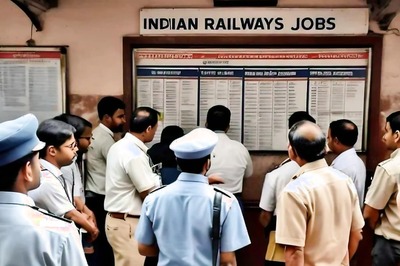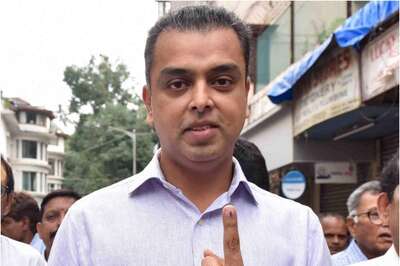
views
In his recent opinion piece for the New York Times about Jammu & Kashmir (J&K), Prime Minister Imran Khan resorts to the usual Pakistani ploy of alluding to a nuclear conflict eight times. It is not surprising if the reader is at a loss to understand the connection between Nuclear and Kashmir — for there is none. But then what else can one expect from an army-nominated spokesperson who grabbed power through a blatantly rigged electoral process in August 2018. Imran Khan (PMIK), a former cricketer-playboy, needs to be more loyal than the King, to remain useful to the de-facto rulers of Pakistan.
Writes Shashi Tharoor about PMIK — “The problem is that he has two faces — a liberal and urbane one, which is seen in London and Mumbai — and an uncompromisingly hawkish Islamist one, an image he reserves for his Pakistani audiences. This is the man who, after all, has had Hafiz Saeed address his early rallies, consorted with extremist parties and movements like the Tehreek e-Labbaik Pakistan and the virulently anti-Shia Sipah-e-Sahaba Pakistan, opposed repealing the blasphemy law, supports the de-recognition of Ahmaddiyas as Muslims…”.
But first the facts. On August 5, the government of India unfettered J&K from the provisions of Articles 370 and 35A of the Constitution. Article 370 was a 'temporary provision', which granted special autonomous status to J&K. Article 35A, introduced later in 1954, stipulated that only permanent residents of J&K could own property in the region. They bred corruption, maladministration, discrimination against women and fissiparous tendencies, besides providing a fertile ground to Pakistan to foment unrest and separatism. Unfortunately, short-sighted political expediency allowed the articles to stand for over six decades.
To recap, under the provisions of Indian Independence Act, 1947, Maharaja Hari Singh, the ruler of J&K, decided to join India. The Instrument of Accession was accepted by Governor General Lord Mountbatten. Meanwhile Pakistani army, a law unto itself, tried to forcibly occupy the state. India succeeded in partly reversing the aggression but instead of going all the way, opted to take the matter to the UN Security Council in 1948. The Council asked both sides to restore status quo ante so that a plebiscite to ascertain the will of the people could be conducted.
As is its wont, Pakistan, wanting to have the cake and eat it too, refused to vacate the occupied territory but kept demanding plebiscite, which was untenable and effectively rendered the UNSC resolution void. Not content, Pakistan ‘gifted’ a part of J&K to its ally China in 1963 and went about absorbing the illegally occupied parts of the state (PoK). It changed the demographics of PoK, as well as, made Gilgit and Baltistan a de facto province. Under the 1972 Shimla Agreement with India, Pakistan solemnly undertook to resolve the J&K issue through bilateral discussions.
However Pakistan, a failing and rogue nation that brazenly proliferated nuclear technology beginning the late 80s to North Korea, Iran and Libya, never honoured its commitments. Since 1989, it has been infiltrating terrorists into J&K and encouraging separatism, which has led to a loss of over 45,000 lives. Today, 35% and 20% of J&K remains under the illegal occupation of Pakistan and China respectively. All that India did on August 5 was to correct a historic wrong inflicted on the residents of J&K and India. The move was welcomed by several opposition parties in Parliament and by the nation at large. Most of the international community, including leading Islamic states like the UAE, recognised the move as an internal matter of India.
In his article — a devious litany of woes and an attempt at fear mongering — PMIK basically makes four assertions. One, India altered the status of J&K. Two, his peace overtures have been rebuffed by India. Three, a nuclear shadow hovers over South Asia. Four, PM Modi was a zealot who was denied visa by the US. These assertions are mischievous, false and polemical.
One, the factual position has already been outlined above. The only remaining business for India is to re-acquire PoK. Two, PMIK’s feelers were tactical and insincere, meant only to deflect global opprobrium, for using terrorism against India as an instrument of foreign policy. While talking peace with a forked tongue, Pakistan’s deep-state perpetrated the barbaric Pulwama (J&K) bombing in February 2019, which consumed over 40 lives. Contrary to PMIK’s denial, India provided the evidence, which convinced the comity of nations but not Pakistan, for it has always maintained deniability.
India has expressed readiness to discuss all issues with Pakistan, provided it takes concrete and irreversible steps towards dismantling the huge India-specific terror infrastructure. The cosmetic steps taken by Islamabad to ward-off blacklisting by FATF (Financial Action Task Force) later next month, are nothing but disingenuous.
Three, Pakistan has been habitually indulging in nuclear sabre-rattling to attract global attention. However, it has cried wolf so often that few other than nuclear Cassandras lose much sleep. India’s policy of no-first-use is well established. Islamabad also knows about India’s resolve and second-strike capability of delivering a massive and non-symmetrical response, to any misadventurism.
Four, PMIK chooses to forget that unlike his country, which has always been under de jure or de facto military rule, India is the world’s largest democracy. Prime Minister Modi has been elected to office with a thumping mandate by the people of India. The politically motivated charges against him some two decades ago have already been dismissed by the Supreme Court of India. A red-carpet has been rolled out for him whenever he has visited the US. At his invitation, President Obama travelled for the second time to India to be feted as the chief guest at India’s Republic Day celebrations in January 2015.
In some ways, one cannot but feel sorry for the people of Pakistan, who have similar aspirations and needs as their Indian brethren. It is unfortunate that Pakistani leaders have been tamely allowing the army, deep-state and jihadis to pursue a self-serving and self-destructive agenda of compulsive hostility towards India. Meanwhile, Pakistan is being bankrupted and is regressing into a narco-terrorist state. It is being propped up by China, which has entrapped it in a web of debt and using it for a proxy-war against India. It is for Pakistan to make a strategic choice between development and deprivation, before it is too late.
(The author is a former diplomat. Views expressed are personal.)
















Comments
0 comment